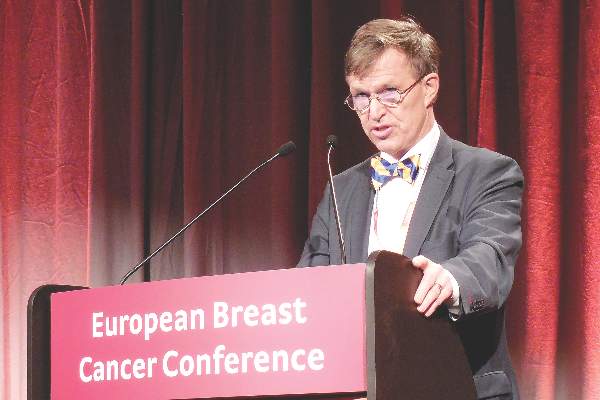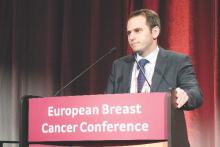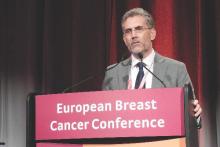AMSTERDAM – A 21-gene expression assessment tool may identify selected breast cancer patients who can safely forgo adjuvant chemotherapy, according to an exploratory analysis of data collected on Recurrence Scores and 5-year disease-free survival in a multicenter German trial primarily designed to compare different chemotherapy regimens.
Recurrence Score joined nodal status, stage, and grade as one of the four prognostic factors that each significantly linked with 5-year disease-free survival in a multivariate-adjusted analysis of 2,642 women with HER2-negative and hormone-receptor positive primary breast cancer, Dr. Oleg Gluz said at the European Breast Cancer Congress. Patients with a low Recurrence Score of 0-11 (on a scale of 0-100) had a 94% rate of disease-free survival during a median 55 months of follow-up when the vast majority of these patients received hormonal therapy only and no chemotherapy, said Dr. Gluz, an oncologist at the Breast Center Niederrhein of Evangelical Hospital Bethesda in Moenchengladbach, Germany. The Recurrence Score is calculated based on results from a RNA-based gene expression test known as Oncotype DX.
A Recurrence Score gene expression profile of 0-11 occurred in 18% of the screened patients, and 86% of these patients accepted the option of no chemotherapy. An additional 30% of the study group had a Recurrence Score of 12-18, and 30% had a score of 19-25, and all these patients with scores of 12-25 collectively had a 94% rate of disease-free survival following chemotherapy during a median 55 months of follow-up. Assigning all these patients with scores of 12-25 likely represents “overtreatment” for patients who also had negative lymph nodes or minimal lymph node involvement, Dr. Gluz said. In the remaining 22% of patients, who had Recurrence Scores of 26 or greater at baseline, the rate of disease-free survival after chemotherapy with a median 55 -month follow-up was 84%, Dr. Gluz reported.
These findings were consistent with an earlier report of disease-free survival after a median 3-year follow-up in the same patients, who were randomized to different chemotherapy alternatives in the PlanB trial, a phase III study primarily designed to assess the relative efficacy and safety of two chemotherapy alternatives in patients with high-risk clinical features including either positive lymph nodes or a high-risk clinical profile despite having negative lymph nodes (J Clin Oncol. 2016 Feb 29. doi: 10.1200/JCO.2015.63.5383). They were also consistent with published 5-year disease-free survival results from a prospective evaluation of the Recurrence Score in more than 10,000 women with node-negative, hormone receptor–positive, HER2-negative breast cancer in the Trial Assigning Individualized Options for Treatment (TAILORx) study (New Engl J Med. 2015 Nov 19;373 [21]:2005-14).
“These results are interesting and provocative, but are not yet practice changing because in these high-risk patients with hormone receptor–positive tumors, relapses can occur several years after treatment so we need to wait for longer follow-up,” commented Dr. Angelo Di Leo, head of medical oncology at Prato (Italy) Hospital. He also cited the need to wait for results from several prospective, randomized trials now in progress that are more directly addressing the role of genetic profiling in predicting patient prognosis and treatment responses.
On Twitter @mitchelzoler




